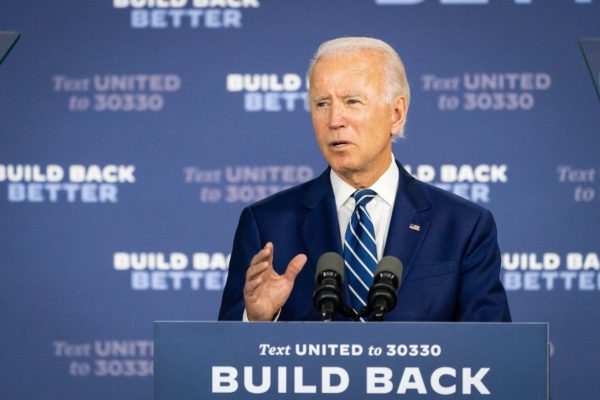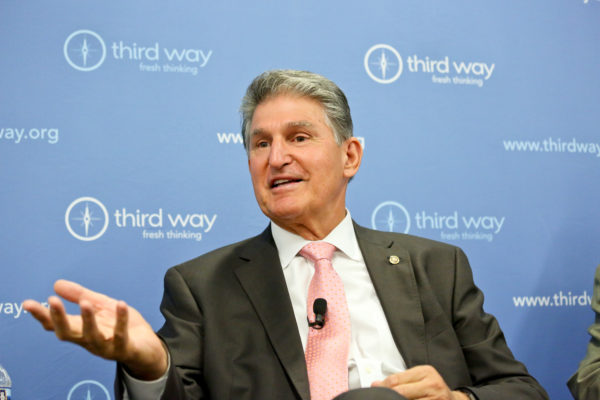One Year of President Biden: A Progressive Revolution or an Uninspiring Façade?
By Joe McFadden

January 20th will mark one year of Joe Biden’s Presidency. Amidst a pandemic, economic crisis, and increasing political polarisation it is fair to say that the issues Biden met with upon his inauguration are some of the most difficult challenges a President has faced upon taking office in American history. Indeed, Biden’s inaugural challenges are comparable to those faced by Presidents Franklin D. Roosevelt and Abraham Lincoln; the Great Depression (1933) and the Secession Crisis of 1861, respectively.
Another unprecedented event in the days leading up to Biden’s inauguration last year was the January 6th Insurrection. Domestic terrorists, called to action by lame duck President Donald Trump, besieged and then stormed the Capitol building. Meanwhile, Congress attempted to count the electoral college votes which confirmed Biden as the winner of the 2020 election. This failed coup d’état would set the stage for the first few weeks of Biden’s presidency as the nation came to terms with the shocking events that had transpired.
All of this is important because it contextualises the political realities that Biden took the Oath of Office in. With all that in mind, let’s look at Biden’s first year in office.
The Good
Despite my many misgivings with Biden and the Democratic Party, it would be unfair to focus solely on their shortcomings. First and foremost, the largest success of President Biden’s Administration has been the greatest vaccination effort in US history. At the time of writing, more than 520 million doses of the vaccine have been administered (Bloomberg, 2022). This means that 63% of the US population have been fully vaccinated against Covid-19. Now, for a country as arguably advanced as America its percentage is relatively low when compared to other countries (e.g. China with 87% fully vaccinated, and Brazil with 79%).
However, Biden cannot be fully blamed for this. The federal nature of the USA means that, even though the federal government orders and distributes the vaccines, it is up to individual state governments to administer the shot. This means that Biden is not technically responsible for the varying rates with which each state has vaccinated its population. This is particularly important when taking into account how misinformation has caused vaccine hesitancy in many states, especially in the Deep South and Rocky Mountain regions. Therefore, the vaccine effort can be attributed as a win for Biden because it has been largely successful in spite of the surge in “Anti Vaxxer conspiracy theories” that have hampered the rollout.
Another success for Biden was passing a $1.9 trillion stimulus bill into law. This relief package gave $1400 in direct aid to all eligible adults. Unlike previous stimulus packages, it included adult dependents like college students or those in receipt of social welfare. Also included in the bill were tax provisions like increasing child tax credits alongside $130 billion in education funding for costs associated with introducing Covid-19 measures like social distancing in classrooms.
Passing the bill into law was a clear success for Biden, especially considering no Republicans in the House of Representatives voted for it (although the Democrats majority in the House nullified their opposition). The economic fallout of the Covid-19 pandemic is forever evolving as governments and markets react to the changing world. Thus, for Biden to have passed a stimulus package of this magnitude is a resounding success. Whilst it does not represent an overhaul of the American economy or is even comparable to the measures introduced by Roosevelt’s “New Deal” in ‘33, Biden’s economic investment will always be a positive aspect to his Presidency.
One final positive of Biden’s first year in office has been his climate policy. In a clear refutation of his predecessor anti-science policies, on his first day in office Biden signed an Executive Order recommitting the US to the Paris Climate Accords. He also cancelled the construction of the Keystone XL pipeline. He also created two new important roles in the fight against climate change after establishing the role of White House National Climate Advisor (Gina McCarthy) and U.S. Special Presidential Envoy for Climate (John Kerry).
These actions are the most significant part of the Biden Administration so far. It is no secret that the fight against climate change is a dire one. Inarguably it needs global leaders to take notice and join the fray. Through the aforementioned acts, Biden has sent a clear message that he is willing to do something about the climate crisis. He has demonstrated that whilst his Presidency may not represent a transformation of the American economy, or a drastic constitutional shake-up, it may be remembered as the moment that the US government began to take climate change seriously and, more importantly, do something about it.

The Bad
On the reverse side of Biden’s end of year report card is his failure to push through more relief measures that are part of his “Build Back Better” policy initiative. “Build Back Better” is a legislative framework that aims to reform and improve the American economy whilst boosting social provisions and fighting climate change. Despite being similar in intent to FDR’s “New Deal” or LBJ’s “Great Society” initiatives, Biden’s plan is relatively tame by comparison.
The issues arise from Biden’s majority of just one vote in the Senate. Currently, the Build Back Better Act is being held to ransom on the senate floor by Senator Joe Manchin III (D-WV) who wants it lowered to $1.5 trillion after already having it lowered from $3.1 trillion to $1.75 trillion.
Another disappointing aspect of Biden’s time in the White House has been the Democratic Party’s unwillingness to take advantage of their control over both Congress and the White House for the first time since 2011. As the Republicans have proven over the past decade, control of Congress is crucial for a President seeking to legislate effectively. So far, the Democrats appear to be lacking.
Control of Congress is not just important for legislation but also for political control of the judiciary. Currently, there is a 6-3 Conservative majority on the Supreme Court and with important votes on civil rights like abortion scheduled for 2022, the Democrats should have taken the opportunity to expand the Supreme Court. Now, such a move would be hugely controversial. Biden himself may not even be in favour of it. However, with polarisation at its worst since the Secession crisis, expanding the Supreme Court may be Biden’s only hope – short of constitutional amendments – to protect the civil rights intrinsic to the American ideal that “All Men are created equal.”
Furthermore, another possible solution to Biden’s woes could be expanding the Senate by way of approving statehood for Washington D.C. and Puerto Rico. Under the U.S. Constitution, Congress has the power by way of a simple majority to admit the aforementioned places into the Union as their citizens have already voted in favour of statehood. By admitting D.C. and PR, the Democrats would create four new Senate seats, making a GOP senate less likely due to the two potential states’ political leanings.
However, any such move would, whether that be Senate or Court expansion, be hugely controversial. It would almost certainly split the centre-right Democratic Party right down the middle. Therefore, even if he did have radical intentions, Biden would struggle to pass any such constitutional measures without Bipartisan support – something that is becoming increasingly rare in Washington these days.

@flickr
And The Ugly
Despite domestic negotiations over ‘Build Back Better’ being an issue, Biden still has the potential to resolve them. What is unresolvable, an unforgivable, however, is the USA’s calamitous withdrawal from Afghanistan.
America first sent troops to Afghanistan in the immediate aftermath of 9/11, beginning with covert CIA operatives and Special Forces aimed at surgically weakening the Taliban government and Al-Qaeda cells residing in the region. What followed was a long and brutal 20 year war that has now culminated in the fall of Kabul and a Taliban resurgence in Afghanistan.
The complete withdrawal of US forces from Afghanistan was a result of the Trump Administration’s 2020 Doha Agreement – a treaty with the Taliban that circumvented the Afghan government whilst agreeing to a total withdrawal based on a “promise” that the Taliban would not challenge the government. Despite multiple analysts predicting that Afghanistan would fall within weeks of US withdrawal, and skirmishes beginning as soon as the first troops withdrew, the Biden Administration still made the disastrous decision to follow through with the plan.
As a result of this haphazard approach to foreign policy, Afghanistan is currently experiencing a humanitarian disaster of catastrophic proportions. A recent UN report has projected that by the middle of 2022 Afghanistan will experience near-universal levels of poverty, with 97% of the population living below the international poverty line of $1.90 a day.
Now, I am not an advocate of the so-called “War on Terror”, nor am I a proponent of military occupations. However, it is crystal clear that the Biden Administration’s decision to continue the withdrawal of troops from Afghanistan is one of the biggest humanitarian failures of recent years. It marks a complete abdication of America’s moral responsibility as a global leader. It is also unfortunately ironic that the past three decades worth of American foreign policy, dating back to Ronald Reagan’s support of the Mujahideen, were directly responsible for causing the conflict which saw Afghanistan thrown into turmoil.
“And that’s the way it is”
Clearly, President Biden has achieved some important policy objectives in his first year in office. His trillion dollar stimulus package came as a relief to many American families facing economic uncertainty amidst the pandemic. Meanwhile, his strong stance on climate change signals a return to global leadership in an age where there is an endless abdication of it.
However, despite his strong domestic policies, Biden’s foreign policy has been nothing short of a disaster. The humanitarian crisis in Afghanistan is morally inexcusable and comes as a disappointing shock that an experienced politician like Biden could have let this happen.
Despite a mixed first year, hope is not lost for President Biden. Even though his approval ratings are declining and the Democrats are projected to lose the House and possibly the Senate in the 2022 Congressional midterm elections, Biden still has an opportunity in the next 6 months to push policies through that will have positive, tangible effects for the American people.
One year into his four year term, Biden’s path forward is still unclear. It is yet to be seen what the long term fallout of the January 6th insurrection will be and how that may affect Biden going forward, but the fact of the matter remains that America is now more deeply polarised than it has been at any time in modern history.
Ultimately, we cannot judge an entire presidency on its freshman year alone. However, what we can be certain of is that President Biden’s remaining time in office will be crucial for defining what America’s legacy will be for the rest of the century.







